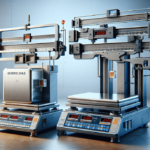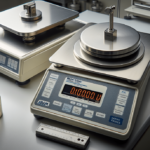CAS RW-L Series vs Mettler Toledo PFA220: A Comprehensive Comparison
If you're in the market for a high-precision weighing scale, the CAS RW-L Series and the Mettler Toledo PFA220 are two top contenders. Renowned for their accuracy, durability, and user-friendliness, both scales serve a variety of applications effectively. However, key differences may make one more suitable for your specific needs. This article provides an in-depth comparison of the CAS RW-L Series and the Mettler Toledo PFA220, examining their features, performance, pros and cons, user reviews, and more to help you make an informed decision.
Overview of CAS RW-L Series and Mettler Toledo PFA220
The CAS RW-L Series is manufactured by CAS Corporation, a South Korean company specializing in industrial and commercial scales. The RW-L Series encompasses a range of models with varying capacities and sizes, all designed for high accuracy and durability. These scales are ideal for industrial environments such as warehouses, production lines, and shipping departments.
In contrast, the Mettler Toledo PFA220 is part of Mettler Toledo’s Precision Balance line, produced by the Swiss-based manufacturer known for precision instruments and services. The PFA220 offers exceptional precision with a readability of 0.1 milligrams and can measure up to 220 grams. It includes advanced features for weighing, counting, and percent weighing, along with software options for data analysis and compatibility with other equipment.
Key Features of CAS RW-L Series
The CAS RW-L Series is distinguished by several standout features:
- High Accuracy: Provides precise measurements with a resolution of up to 1/10,000.
- Durability: Constructed with a stainless steel platform and sealed indicators to resist dust, moisture, and vibration.
- Easy Operation: Features a large, easy-to-read display and intuitive buttons for straightforward navigation.
- Multifunctional: Capable of weighing, counting, accumulating, and checkweighing.
- Connectivity Options: Offers multiple connectivity options including RS-232, USB, and Ethernet for seamless data integration.
Additionally, the CAS RW-L Series includes a built-in rechargeable battery, enabling portable use without the need for a power outlet. This is particularly useful for mobile applications such as farmers markets or food trucks, where electricity access may be limited.
Key Features of Mettler Toledo PFA220
The Mettler Toledo PFA220 is packed with features that make it a preferred choice for high-precision applications:
- Exceptional Precision: Offers a readability of 0.1 milligrams, making it one of the most accurate scales available.
- Advanced Functionality: Includes a built-in database for storing measurements, and software options for statistical analysis and reporting.
- User-Friendly Interface: Equipped with a large touchscreen display that is easy to navigate and customize.
- Multi-Language Support: Supports multiple languages, facilitating global use.
- Compliance: Meets international standards such as GLP/GMP, ISO, and pharmacopeia, suitable for regulated industries.
Accuracy Comparison
Both the CAS RW-L Series and the Mettler Toledo PFA220 excel in accuracy. The CAS RW-L Series offers a resolution of up to 1/10,000, equivalent to 0.01% of the scale's capacity, making it suitable for precise measurements in industrial settings. Meanwhile, the Mettler Toledo PFA220 boasts a readability of 0.1 milligrams, enabling it to measure extremely small quantities with high precision. According to industry standards outlined by the International Organization for Standardization (ISO), both scales maintain exceptional accuracy required for various applications.
Durability Comparison
Durability is paramount in industrial and laboratory environments. The CAS RW-L Series features a stainless steel platform and sealed indicators, protecting against dust and moisture while ensuring a stable weighing surface. It also includes overload protection to prevent damage from excessive weight. On the other hand, the Mettler Toledo PFA220 has a die-cast metal housing that provides excellent resistance to impact and wear. Its easy-to-clean surface prevents debris from accumulating, enhancing the scale’s longevity. Both scales are designed for long-term use in demanding settings, as supported by numerous positive customer reviews.
User-Friendliness Comparison
User interface is crucial for productivity and efficiency. The CAS RW-L Series features large buttons and a clear display that shows the weight and provides audible and visual alerts for checkweighing. It allows programming of preset functions to streamline repetitive tasks. In contrast, the Mettler Toledo PFA220 offers a robust touchscreen interface that is easy to navigate and customize. It includes a user profile system, enabling different users to save their preferred settings for quick access. Both scales are designed for ease of use, making them accessible to users with minimal training.
Pros and Cons
CAS RW-L Series
Pros:
- High accuracy
- Durable construction
- Easy operation
- Multifunctional capabilities
- Multiple connectivity options
Cons:
- May not suit ultra-high precision applications
- Lacks advanced data analysis and reporting features
Mettler Toledo PFA220
Pros:
- Exceptional precision
- Advanced data analysis and reporting capabilities
- User-friendly touchscreen interface with customizable settings
- Compliance with international standards
- High weighing sensitivity
Cons:
- Higher cost may be prohibitive for small businesses
- Limited weighing capacity compared to some industrial scales
Key Considerations for Choosing Between CAS RW-L Series and Mettler Toledo PFA220
When selecting between the CAS RW-L Series and the Mettler Toledo PFA220, consider the following factors:
- Precision Needs: For applications requiring ultra-high precision, the Mettler Toledo PFA220 is superior due to its exceptional accuracy and advanced features.
- Durability and Versatility: The CAS RW-L Series is ideal for environments that demand robust and versatile scales capable of performing multiple functions.
- Budget Constraints: The Mettler Toledo PFA220 may be more expensive, making the CAS RW-L Series a more cost-effective option for budget-sensitive projects.
- Compliance Requirements: If operating within regulated industries, the compliance features of the Mettler Toledo PFA220 are essential.
Assessing these factors in relation to your operational needs will help you choose the scale that best aligns with your business requirements.
User Reviews
CAS RW-L Series Reviews
Customers generally provide positive feedback on the CAS RW-L Series, highlighting its accuracy, durability, and ease of use. Users particularly appreciate the large display, unit switching capabilities, and rapid weight calculation. The connectivity options are also praised for allowing seamless integration into various systems. However, some users have noted the scale's limited weighing capacity and the absence of advanced data analysis features as areas for improvement.
Mettler Toledo PFA220 Reviews
The Mettler Toledo PFA220 receives overwhelmingly positive reviews, with customers commending its remarkable accuracy, extensive feature set, and user-friendly interface. The ability to store and recall past measurements and the built-in counting accuracy are frequently mentioned as standout features. While most users are satisfied, a few have reported minor connectivity issues and concerns about the scale's high price point, which may be a barrier for smaller businesses.
Conclusion: Which Scale is Right for You?
The choice between the CAS RW-L Series and the Mettler Toledo PFA220 ultimately depends on your specific weighing requirements:
- If you need a sturdy and versatile scale with robust connectivity options, the CAS RW-L Series is an excellent choice.
- If your application demands exceptional accuracy, advanced data analysis, and regulatory compliance, the Mettler Toledo PFA220 is the ideal scale, despite its higher cost.
Both scales offer top-tier performance, functionality, and reliability. Conduct thorough research and evaluate your operational needs to select the scale that best fits your business.
Where to Buy CAS RW-L Series and Mettler Toledo PFA220
The CAS RW-L Series and Mettler Toledo PFA220 are available through various industrial and laboratory supply stores, both online and offline. For the best service and technical support, purchase them from authorized vendors. Visit the ShipScience online store to explore available options and make a purchase.
Frequently Asked Questions About Weighing Scales
What are the different types of weighing scales available in the market?
A: There are several types of weighing scales, including:
- Bench Scales: Ideal for smaller quantities, commonly used in laboratories and retail settings.
- Floor Scales: Suitable for heavier loads, often used in industrial and commercial environments.
- Counting Scales: Designed to count bulk items like pills or small parts by weight.
- Postal Scales: Used for weighing packages to determine shipping costs.
- Crane Scales: Utilized for measuring very heavy loads, typically in construction and shipping industries.
What are the common applications for weighing scales?
A: Weighing scales are used across various industries, including:
- Manufacturing: Measuring raw materials and finished products.
- Healthcare: Monitoring patient weight and dosing medications.
- Food and Beverage: Ensuring accurate ingredient measurements for recipes and packaging.
- Shipping and Logistics: Weighing packages and freight for transportation.
- Agriculture: Weighing produce, livestock, and feed.
How do I calibrate a weighing scale?
A: Calibration procedures vary depending on the scale type and manufacturer. Generally, you can calibrate a scale by:
- Referencing the user manual for specific instructions.
- Using certified calibration weights appropriate for your scale's capacity.
- Ensuring the scale is on a level surface and free from vibrations.
- Following the on-screen prompts or software instructions if applicable.
- Contacting the manufacturer for professional calibration services if needed.
How often should I recalibrate a weighing scale?
A: The frequency of calibration depends on several factors, including:
- The scale's usage frequency and load variations.
- The environment in which the scale operates (e.g., exposure to dust, moisture, or vibrations).
- Regulatory requirements specific to your industry.
- Manufacturer recommendations.
Generally, it's advisable to recalibrate scales at least once a year or more frequently if the scale is used heavily or in harsh conditions.






















